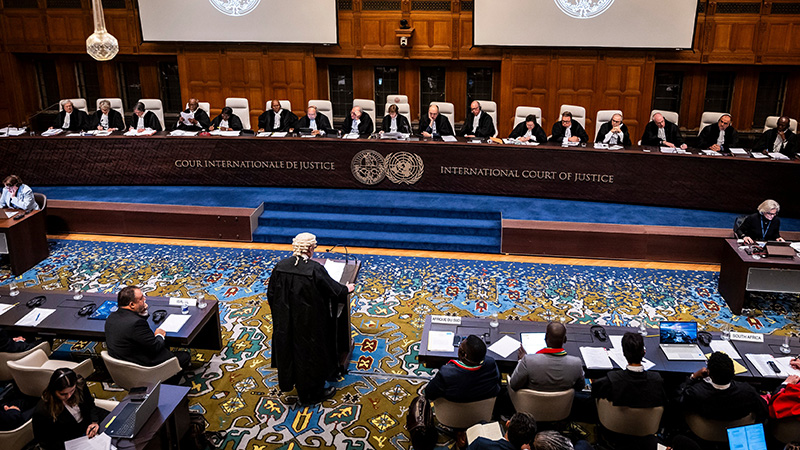ICJ Ruling on Israel’s Illegal Occupation of the Palestinian territories
Israel’s 57-year occupation of the Palestinian territories is illegal
The International Court of Justice (ICJ) issued a landmark advisory opinion on July 19, 2024, declaring Israel’s 57-year occupation of the Palestinian territories, including the West Bank, East Jerusalem, and Gaza, to be unlawful under international law. The non-binding ruling, requested by the UN General Assembly in December 2022, stated that the occupation must end “as rapidly as possible,” with Israel required to withdraw all settlers, dismantle settlements, cease annexation policies, and provide reparations for damages caused. The court emphasized violations of international humanitarian law, human rights law, and the right to self-determination, including acts amounting to apartheid and racial discrimination. While welcomed as historic by Palestinians and rights groups, Israel rejected it, vowing to continue settlement expansion.

Background and Proceedings
The ICJ hearings stemmed from a UN General Assembly resolution seeking an advisory opinion on the legal consequences of Israel’s prolonged occupation, settlement activities, and policies altering the demographic composition of the occupied territories. Hearings began in February 2024 at The Hague, with over 50 countries and organizations presenting arguments. Palestine argued that the occupation violates key principles of international law, including prohibitions on acquiring territory by force and denying self-determination. South Africa opened the case, highlighting parallels to apartheid. The Gambia urged the court to affirm the occupation’s illegality and obligate Israel to end it immediately.
Key Findings of the Ruling
The ICJ’s 83-page opinion, delivered by President Nawaf Salam, outlined multiple violations:
- Unlawful Occupation and Annexation: The court ruled that Israel’s presence in the occupied territories breaches the prohibition on territorial acquisition by force and the Palestinian right to self-determination. It declared the occupation itself illegal, requiring immediate cessation. Policies of annexation, including in East Jerusalem and the West Bank, were deemed violations of international law.
- Settlements and Settler Evacuation: All Israeli settlements in the West Bank and East Jerusalem were ruled illegal, with approximately 700,000 settlers required to be evacuated. The court called for the dismantling of settlements and an end to new construction, stating these activities amount to de facto annexation.
- Discrimination and Apartheid: The ruling found Israel’s policies, including differential treatment of Palestinians and Israelis, violate prohibitions on racial segregation and apartheid. It highlighted systematic discrimination in resource allocation, movement restrictions, and legal systems.
- Reparations and Withdrawal: Israel must pay reparations for damages, including restitution and compensation for exploitation of Palestinian resources. The court mandated a full withdrawal from the territories, including Gaza, where Israel retains effective control despite 2005 disengagement.
- Obligations on Other States and the UN: All states and international organizations must not recognize the occupation as lawful or render aid in maintaining it. The UN, particularly the General Assembly and Security Council, should consider actions to end the occupation
The official ICJ report on the illegality of Israel’s occupation of the Palestinian territories, including the West Bank, East Jerusalem, and Gaza, is titled “Legal Consequences Arising from the Policies and Practices of Israel in the Occupied Palestinian Territory, Including East Jerusalem.” It was published on July 19, 2024, and is available on the International Court of Justice’s official website.
URL: https://www.icj-cij.org/sites/default/files/case-related/186/186-20240719-adv-01-00-en.pdf










